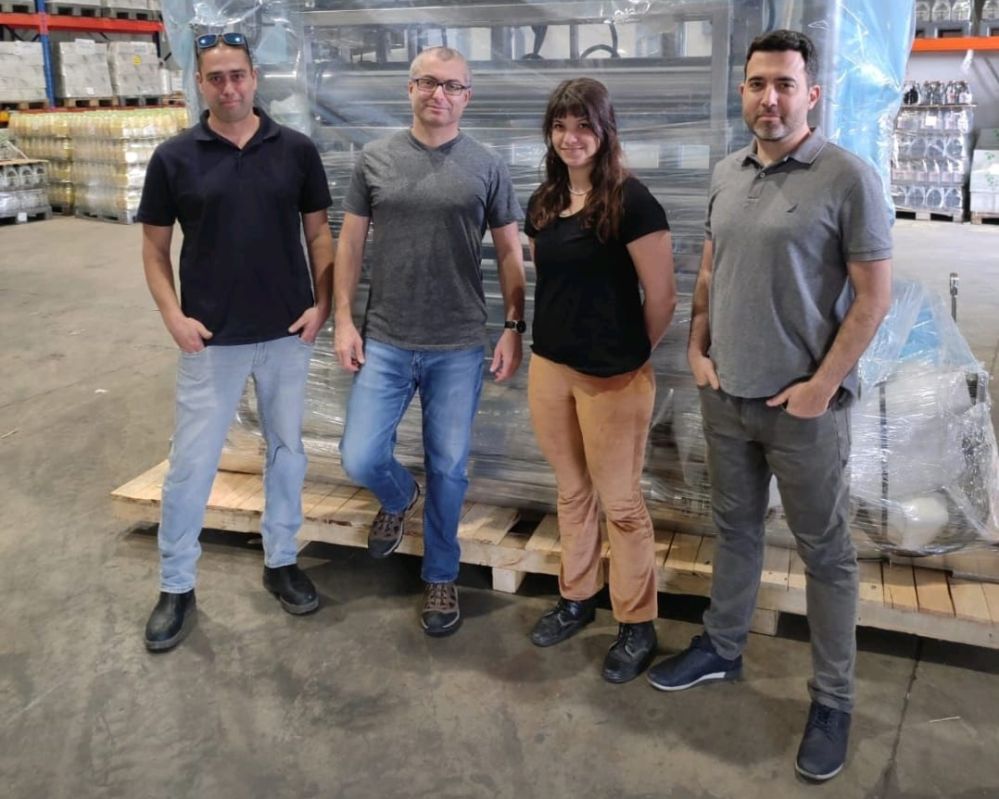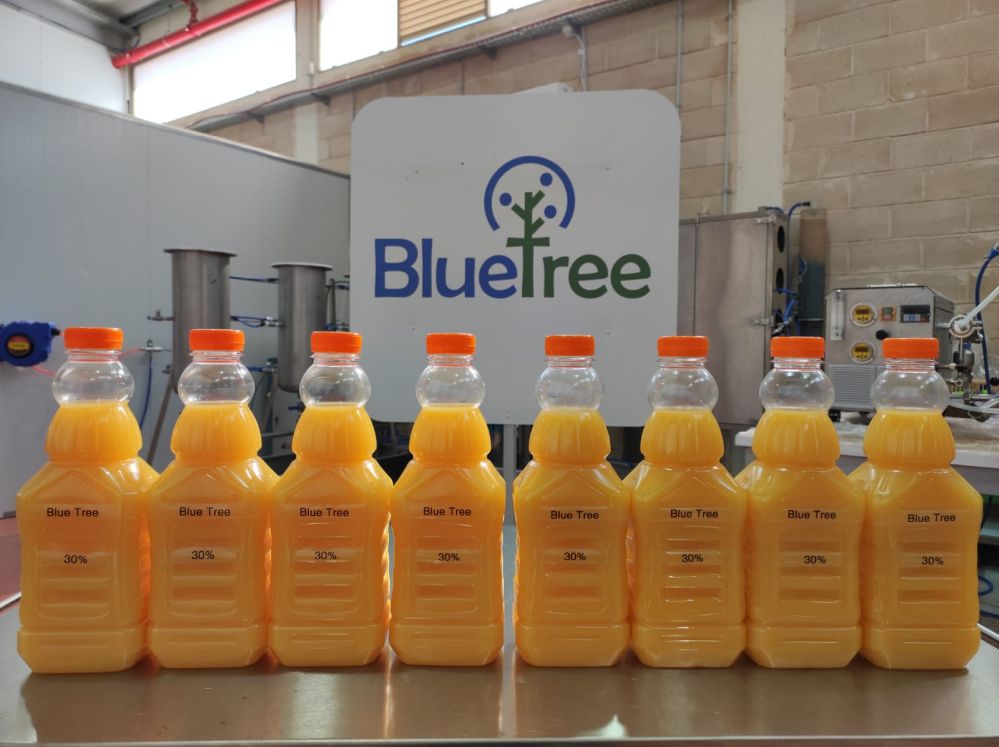Blue Tree Technologies—an Israeli startup using a patented process to selectively remove sugars from juice, milk, and beer—has secured self-GRAS status for its approach and has successfully scaled its solution with Israeli juice manufacturer Priniv.
The startup, which is now in talks with leading juice manufacturers around the globe, is one of several foodtech firms seeking to cut sugar in juice, with approaches ranging from enzymatic treatments that convert sugars to fibers (Better Juice) to microbes that eat the sugar (IncreBio).
Blue Tree, in contrast, uses ultrafiltration coupled with adsorption to selectively remove disaccharides such as sucrose, lactose, and maltose from natural beverages such as juice, milk, and beer without sacrificing taste or compromising brands’ clean label credentials.
Priniv awaiting Ministry of Health approval for commercial launch in Israel
Founded in 2020 by Didier Toubia (cofounder and CEO at cultivated meat startup Aleph Farms) and Yuval Klein, Blue Tree graduated from Israel’s Fresh Start incubator in June 2022. In the interim period, the company “took its idea from lab scale to prototype scale and signed an agreement with Priniv,” says CEO Michael Gordon, who joined the team in July 2022. “In 2023, we fully scaled up our solution and expanded our development to other categories beyond orange juice.”
He adds: “We’ve fully integrated our system at Priniv, so we are just waiting for final approval from the Israeli Ministry of Health so Priniv can start marketing a 33% sugar reduced orange juice in the Israeli market.
“Over the last year, our system underwent significant internal and external review and safety testing. This process included direct interaction with the FDA to ensure the system meets all relevant safety standards.
“We plan to license the system to juice producers around the world, and we’re currently negotiating with large-scale manufacturers in Latin America, Southeast Asia, and Europe. They are looking at the numbers and saying this is cost effective. We are aiming to charge not more than 5% of the gross margin.”
Manufacturers can also generate revenue from the sugar that is removed from the juice, he notes. “They can reuse it for other purposes in their operations, for example if they make lemonade, where you need to add sugar, or sell it to other industries.”

Filtration and adsorption
So how does it work?
The basic premise behind the tech is that disaccharides (sugar molecules comprising two simple sugars) such as sucrose (made from fructose and glucose) and lactose (made from galactose and glucose) are not as sweet as monosaccharides (simple sugars such as glucose and fructose), says Gordon.
As a result, removing 30% of the sugar in a juice through removing disaccharides does not necessarily make a beverage taste 30% less sweet, he says. “It’s not a linear effect, so if you cut it by 30%, it tastes more like 15% because fructose [the simple sugars remaining in the beverage] are sweeter than sucrose. And with a 20% sugar reduction using this approach, you won’t even notice a difference.”
“So the question was, how do we remove the disaccharides but leave the monosaccharides and other things in the juice intact?”
Blue Tree’s first patent describes a two-step process, he explains. “The first part is ultra filtration and the other part is an adsorption process. We found out the mineral zeolite acts like a magnet to disaccharides in juice [sucrose] vs monosaccharides and organic acids.”
Ultra-filtration will enable a certain level of sugar reduction, but there’s a limit, says Gordon. So companies such as Fairlife may use it to remove some lactose from milk, for example, but they still have to add enzymes (lactase) to break down the remaining lactose into simple sugars.
“We have a second patent [pending] that explores an alternative separation technique, not involving zeolite, combined with ultrafiltration. Both methods offer flexibility in application. But we emphasize that throughout the sugar reduction process, including acidity adjustment, we do not introduce any external ingredients. This ensures a clean label and maintains the natural integrity of the juice.”
‘We’re not recommending taking out all of the sugar’
The Blue Tree system enables firms to cut significant amounts of sugar, but given that sugar impacts mouthfeel as well as sweetness, Gordon says firms need to find the right balance.
“So in orange juice 50% of the sugar is disaccharides, so we can cut total sugar by 50%. In pineapple juice it’s 60%. In milk, we’re able to remove 75% of the sugar, while in beer, we’re able to take out all of it, so we can create zero-sugar beer.”
But he adds: “We’re not recommending taking out all of the sugar from these beverages. Our first recommendation is typically 30%, although the ability to take out more is there.”
When it comes to sweetness, he says, part of our perception of this is through aroma. “When you smell the juice [that has gone through Blue Tree’s treatment], it has the same smell. So it doesn’t feel like the juice has been diluted.”
However, once you get to a 50% sugar reduction in an orange juice, for example, there will be perceptible differences in mouthfeel, he says.
Labeling
According to Gordon, labeling may “differ from one territory to another. In the US, for juice, as long as you’re using 100% natural juice and you’re not adding anything, you’re just removing the sugar, you can label it as 100% juice. In the EU, currently, juice that has gone through our process cannot be labeled as juice, but rather as a drink or a beverage.”
However, this looks set to change under the proposed ‘breakfast directives,’ which would permit terms such as ‘reduced-sugar fruit juice’ provided nothing has been added to the juice*, he notes.
The business model
According to Gordon, “We offer a leasing model. It’s a turnkey solution, but it takes us no more than two months to fully integrate our system into a partner’s manufacturing line. Once the system has been fully integrated, we charge a service fee to handle everything. So for example, the system needs consumable replacements every once in a while, so we handle it. But the day-to-day maintenance is very straightforward [and can be handled by the operator].”
Down the road, he says, “We see our customers as partners, so we aim to charge royalties, because there’s a lot of developments and added features that we can add in the future. As an example, some juice manufacturers are not working with just one fruit, and they’re looking to vary sugar reduction levels, so they could have a portfolio of sugar-reduced products.”
Consumers want less sugar… and a clean label
While per capita consumption of juice has been falling in some markets—a trend that was temporarily reversed during the early weeks of the COVID 19 pandemic when shoppers guzzled OJ in an effort to shore up their immune systems—consumers are looking for lower-sugar options across the beverage set, says Gordon.
But they also want natural, less processed, clean label products, and Blue Tree can deliver both. “We see our approach as a no brainer if products can still be labeled as sugar reduced 100% juice; you still just have one ingredient on the ingredients list.”
He adds: “What our partners appreciate about our team is that we come from the industry, so we know how to approach manufacturers and provide them with a very agile solution, which is very important, as manufacturers, especially in the beverage industry, can be very conservative.”
Investors in Blue Tree include OurCrowd, Tnuva, Tempo, Finistere, Siddhi Capital, NevaTeam Partners, and Ratio Technologies, says Gordon, who is currently talking to an undisclosed corporate venture capital firm about raising additional capital to fund its commercial rollout.
* Agreement on these terms was reached by the European Parliament, Council and Commission in January 2024, but is now subject to formal approval by the co-legislators. From entry into force 20 days after publication of the final text, Member States will then have 18 months to transpose the provisions into national law and six more months before the law applies throughout the EU.





